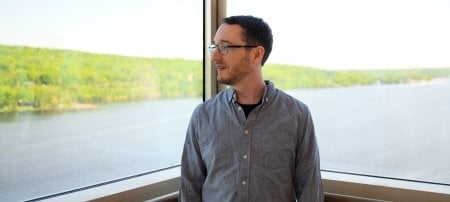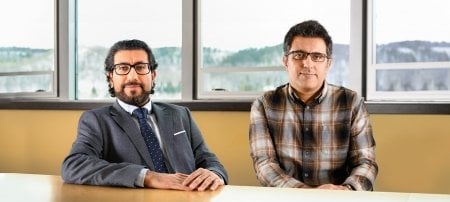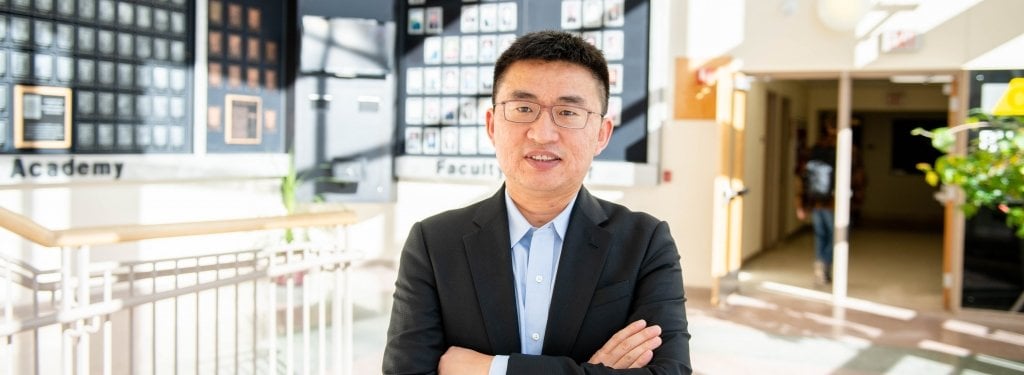For community health, clean water, and longer-lasting batteries. To teach the researchers of tomorrow. Michigan Tech innovators share what they do and why they do it.

Jason Carter
Assistant to Vice President for Research Development
Chair and Professor Kinesiology and Integrative Physiology
What I do: Participate in an 18-month fellowship to build up researchers in academic leadership
"Selection for this important national program was very competitive. Jason is a recognized leader for innovative solutions to reduce administrative burden."
Association of Public and Land-Grant Universities' (APLU) Council on Research (CoR) Inaugural Research Leaders Fellow

Zhaohui Wang
Assistant Professor Electrical and Computer Engineering
Great Lakes Research Center
What I do: Work with intelligent, eco-friendly acoustic communication and networking systems underwater
Why I do it: To remotely and wirelessly communicate with sensors in lakes and oceans, including the Great Lakes during icy months
Faculty Early Career Development Program (CAREER) Award Recipient, National Science Foundation (NSF)

Xiaohu Xia
Assistant Professor Chemistry
What I do: Refine tests that detect biomarkers for cancer and infectious diseases, using corrosion-resistant metals
Why I do it: To make clinical diagnostics more simple and more precise
Faculty Early Career Development Program (CAREER) Award Recipient, National Science Foundation (NSF)

Lucia Gauchia
Assistant Professor Electrical and Computer Engineering
Mechanical Engineering-Engineering Mechanics
What I do: Use ecological tools to better understand battery aging
Why I do it: For longer lasting battery technology, for applications ranging from electric vehicles to repurposed batteries for grid applications
Faculty Early Career Development Program (CAREER) Award Recipient, National Science Foundation (NSF)

Stephen Techtmann
Assistant Professor Biological Sciences
Great Lakes Research Center
What I do: Gather water samples from ports around the world, looking for unique microbes
Why I do it: For a better way of monitoring maritime provenance of small ships
Young Faculty Award Recipient, Defense Advanced Research Projects Agency (DARPA)
Connecting the University with the Community
Portage Health Foundation helped fund three endowed professorships—learn how they’re improving the future of health sciences for Innovation Shore and beyond:

Qiuying Sha
Endowed Professor of Population Health
How? Use statistical models for personalized medicine
We live in the age of big data. Using vast datasets, Sha is able to study the genetic
risk for individuals and the prevalence of diseases in a given population. She has
applied statistical genetic analyses to hypertension, type II diabetes, and neurodegenerative
diseases like Alzheimer’s and ALS. The goal is to provide tools for more targeted
and preventative interventions for overall community health in the Keweenaw.

Keat Ghee Ong
Endowed Professor of Technological Innovations in Health
How? Make smarter health technologies
Ong’s biomedical engineering research gets at the universal well-being of all people.
He wants everyone to have access to better technologies that can improve their recovery
from surgery and injury. But he also says he is equally invested in making an impact
in the Keweenaw region. Building community along with stronger bones is a key goal
of his new responsibilities that goes beyond the indirect benefits of bringing in
research dollars, more students, and supporting local business.

William Cooke
Endowed Professor of Preventative and Community Health
How? simple solutions with a big impact
Eat less, move more. Simple-sounding advice from Cooke, an exercise physiologist,
who looks specifically at how nerves coordinate blood flow through the heart and brain.
Cooke has worked with astronauts and world-class athletes. Now he’s helping confront
the Keweenaw’s most prevalent health concerns including diabetes, heart disease, and
smoking.
Michigan Technological University is an R1 public research university founded in 1885 in Houghton, and is home to nearly 7,500 students from more than 60 countries around the world. Consistently ranked among the best universities in the country for return on investment, Michigan's flagship technological university offers more than 120 undergraduate and graduate degree programs in science and technology, engineering, computing, forestry, business, health professions, humanities, mathematics, social sciences, and the arts. The rural campus is situated just miles from Lake Superior in Michigan's Upper Peninsula, offering year-round opportunities for outdoor adventure.




